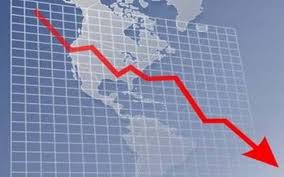Worst Economy In 5,000 Years?

Lowest Interest Rate In 5,000 Years
According to Bank of England economist Andy Haldane, Bank of America Merrill Lynch economistMichael Hartnett and others, we’ve got the lowest interest rates in 5,000 years:
The inventor of quantitative easing – economics professor Richard Werner – says that it’s a myth that interest rates drive the level of economic activity. According to Werner, the data shows that rates lag the economy.
In other words, interest rates respond to what’s already happened in the economy. So does having the lowest interest rates in 5,000 years imply that we’ve had the worst economy in 5,000 years?
We don’t know, but there are quite a few signs that something is very wrong with the world economy …
Other Depression Indicators
We noted in 2009 that more Americans will be unemployed than during the Great Depression.
We noted in 2010:
The following experts have – at some point during the last 2 years – said that the economic crisis could be worse than the Great Depression:
- Fed Chairman Ben Bernanke (and see this)
- Former Fed Chairman Alan Greenspan (and see this and this)
- Former Fed Chairman Paul Volcker
- Economics scholar and former Federal Reserve Governor Frederic Mishkin
- The head of the Bank of England Mervyn King
- Nobel prize winning economist Joseph Stiglitz
- Nobel prize winning economist Paul Krugman
- Former Goldman Sachs chairman John Whitehead
- Economics professors Barry Eichengreen and and Kevin H. O’Rourke (updated here)
- Investment advisor, risk expert and “Black Swan” author Nassim Nicholas Taleb
- Well-known PhD economist Marc Faber
- Morgan Stanley’s UK equity strategist Graham Secker
- Former chief credit officer at Fannie Mae Edward J. Pinto
- Billionaire investor George Soros
- Senior British minister Ed Balls
We explained in 2011 that many economists agree we’re in a depression … and they only argue about whether we’re facing the “Great” depression of the 1930s or the “Long” depression of the 1870s. We also noted that housing prices fell farther than during the Great Depression.
In 2012, we wrote:
We’ve repeatedly pointed out that there are many indicators which show that the last 5 years have been worse than the Great Depression of the 1930s, including:
- The housing slump
- The level of inequality between rich and poor (too much inequality destroys economies)
- The interconnectedness of financial systems and economies worldwide (interconnectedness leads to financial instability)
- Runaway spending and greed
***
Indeed, the number of Americans relying on government assistance to obtain basic foodmay be higher now that during the Great Depression. The only reason we don’t see “soup lines” like we did in the 30s is because of the massive food stamp program.
We noted in 2013 that the British economy is worse than during the Great Depression, and more Americans are committing suicide than during the Great Depression.
We pointed out in 2014 that Europe is stuck in an economic malaise worse than a depression, and citedcharts showing that Europe’s GDP is recovering much slower than after the Great Depression:


We also noted that Americans fared better after the Great Depression than the 2008 crisis and that U.S. foreclosure rates are comparable to the Great Depression.
Last year, we noted that an important economic indicator – the velocity of money – has crashed far worsethan during the Great Depression, and that the howling winds of deflation are hammering the U.S. just as much as Europe.
We noted that last year was the first pre-election year stock market loss since the Great Depression.
In January, we pointed out that a prominent economist said:
Future economic historians may not call the period that began in 2007 the “Greatest Depression.” But as of now, it is highly and increasingly probable that they will call it the “Longest Depression.”
In March, the Federal Reserve Bank of St. Louis noted that – as with Europe – America’s GDP is recovering much slower than after the Great Depression:
 And last month, Pew reported:
And last month, Pew reported:
More young adults in the U.S. are living with their parents than at any time since around 1940, according to a new Pew Research Center analysis of census data.
Across the European Union’s 28 member nations, nearly half (48.1%) of 18- to 34-year-olds were living with their parents in 2014 ….
***
Similar long-term trends have been observed elsewhere. Canada’s most recent census, in 2011, found that 42.3% of adults ages 20 to 29 lived in their parents’ homes, up from 32.1% in 1991 and 26.9% in 1981. In Australia, about 29% of 18- to 34-year-olds were living with one or both of their parents (but without a partner or child) in 2011, up from 21% in 1976. And in Japan, the share of 20- to 34-year-olds living with their parents grew from 29.5% in 1980 to 48.9% in 2012.



